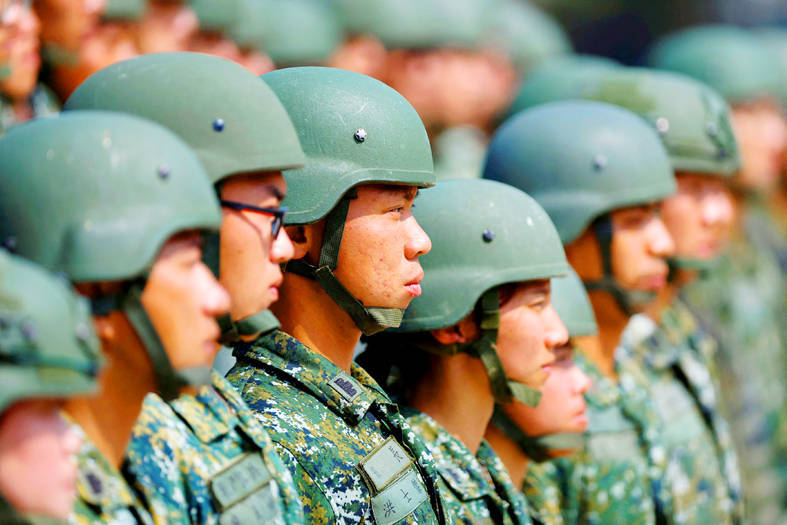《TAIPEI TIMES》 Most would fight China, US officer’s research shows

Soldiers stand in formation as Taiwanese President Tsai Ing-wen visits a military base in Chiayi on March 25. Photo: Reuters
By Sun Yu-ching and William Hetherington / Staff writers
Roughly 70 percent of Taiwanese would likely be willing to fight to defend Taiwan in the event of a Chinese invasion, a Taiwanese-American US Air Force captain said on Saturday.
Captain Jimmy Chien, who serves as the US Air Force’s China and Taiwan affairs program director, made the statement during an interview with Voice of America on Saturday.
Chien on Wednesday last week published an article titled “Conversations with the Taiwanese about Taiwan’s defense” through the Washington-based think tank Global Taiwan Institute. The article detailed Chien’s discussions with 100 Taiwanese about Taiwan’s defense, which conducted over the course of a recent six-week stay in Taiwan.
“I talked to them mainly because I wanted to understand how they felt about a potential Chinese invasion and their willingness to go to war,” he said.
Chien’s subjects ranged from university students to retirees, and included taxi drivers and people he met in various locations including night markets and hot springs, he said.
Chien said that most of those he spoke with do not believe that China would attempt an invasion of Taiwan, despite an increase in China’s military capabilities and its use of military pressure against Taiwan. Many also responded that they believe that the Chinese Communist Party’s (CCP) priority would be to deal with the internal problems the party faces, he said.
However, if China were to attempt an invasion, only 10 percent would likely surrender, 20 percent would leave Taiwan if possible and the remaining 70 percent would likely resist, he said.
“Taiwanese want to give it their best, and they feel that doing so relies on two factors: sufficient training and US support,” he said.
“These factors would provide Taiwanese with something of utmost importance, though intangible: hope. As long as there is hope, they will keep fighting,” he added.
While those he spoke with said they are aware that the US would not likely put troops on the ground in Taiwan, they felt it would commit to logistical support of the sort seen in Ukraine, he said.
However, Taiwanese understand the difficulty of maintaining supplies on an island, and that even with proper training, there would be very little they could do once vital supplies are depleted, he said.
“Most men of military age said they were willing to fight to the end, but on the condition they had the necessary training and tools to give them a chance for survival,” he said.
“They have repeatedly emphasized that they refuse to be cannon fodder and do not want to die needlessly,” Chien said.
While nobody he talked to wanted war, most said they wanted to be ready if they were forced to fight, he said.
Although the Taiwanese government has established a national defense mobilization department, extended the compulsory military service period from four months to one year, and increased the training time for reserve soldiers, these reforms are still too few and too slow to take effect, he said.
Formalizing US support for Taiwan in the event of unprovoked attacks would go a long way toward alleviating Taiwanese’s widespread concerns about being abandoned by the US, he said, adding that Taiwanese authorities must also focus on necessary defense reforms, such as improving military training.
Taiwan’s military must focus on practical training rather than employing “scripted drills,” he said.
“People I’ve spoken with describe Taiwan’s military exercises as being like a rehearsal for a play, rather than preparation for a military operation,” he said. “Many people also say that they are not empowered to make timely changes in different training scenarios, and generally have to wait for approval from superiors.”
The military should focus on “dynamic and tactical decisionmaking at the lowest level” in its training, he said.
Anyone who is familiar with Chinese history knows that the strict top-down decisionmaking process that exists in Taiwan’s military was one of the main factors that led to the Chinese Nationalist Party’s (KMT) military defeat during the Chinese Civil War, he said.
Since Taiwan’s reserve commands are distributed regionally, reservists should also be trained on the defense of their respective regions, he said.
“Taiwan is in an unenviable position and must act quickly to make changes, otherwise it will be too late,” he said.
“Taiwanese people have considerable will to fight, but the success of defense efforts depend on whether the country’s leaders embrace this spirit and provide the best preparations,” he said.
新聞來源:TAIPEI TIMES
















